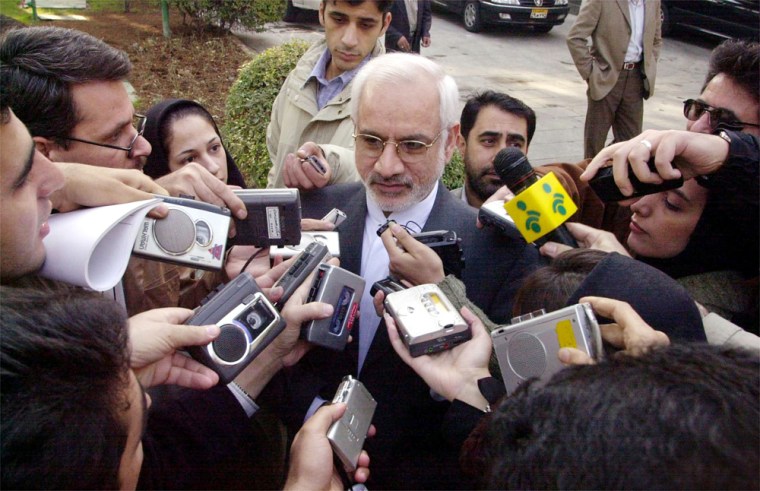Iran signed a key accord Thursday opening its nuclear facilities to unfettered and unannounced inspections, a Western demand amid lingering suspicions that Tehran is concealing an atomic weapons program.
The signing came after months of pressure from European nations and a U.S. push for Iran to be slapped with U.N. sanctions. Iran had been promising since October to sign the accord, but its failure to follow through had raised criticism that it was stalling.
Iranian representative Ali Akbar Salehi and Mohamed ElBaradei, head of the International Atomic Energy Agency, signed the agreement at the IAEA’s headquarters in Vienna.
The agreement, tacked on to the Nuclear Nonproliferation Treaty, requires Iran to submit to intrusive and surprise U.N. inspections of its nuclear complexes and research facilities.
Iran insists program is peaceful
Iran insists its nuclear program is peaceful and geared only toward producing electricity. The United States has accused Tehran of secretly trying to develop nuclear weapons.
After the Sept. 11 attacks, President Bush labeled Iran part of an “axis of evil” along with Saddam Hussein’s Iraq and North Korea, which Washington also suspects of developing weapons of mass destruction.
Iran’s leaders insist the inspections will clear it of the suspicions.
“We have agreed to sign ... to give a strong response to accusations against us and demonstrate that our nuclear activities are peaceful,” Vice President Gholamreza Aghazadeh told reporters in Tehran.
The IAEA’s 35-nation board of governors censured Iran in November for 18 years of secrecy in a resolution that warned Tehran to stay in line with international efforts to make sure the country has no nuclear weapons ambitions.
Although the resolution did not directly threaten U.N. sanctions — a tougher approach that Washington had sought — it warned Tehran that the IAEA would consider further action if “further serious Iranian failures” arise.
The wording implicitly warned Iran that the agency could report it to the Security Council, which has the power to impose economic or diplomatic sanctions.
U.S. State Department spokesman Richard Boucher said Wednesday that Washington welcomed Iran’s signing of the pact, but cautioned that it was “only one step toward resolving the remaining open questions about Iran’s nuclear program.”
Under international pressure, Iran also has agreed to suspend its enrichment of uranium, which it says had been confined to non-weapons uses anyway.
The IAEA has been working to determine the source of traces of highly enriched, weapons-grade uranium on centrifuges and other equipment purchased abroad by Iran. The Iranian government contends the equipment already was contaminated when it acquired it.
‘A strong sign of Iran's transparency’
Sadeq Zibakalam, a political analyst and professor at Tehran University, called Thursday’s signing “a strong sign of Iran’s transparency.” But Zibakalam warned that the country might stop cooperating if Europe ignores Iran’s requests for help in obtaining advanced nuclear technology.
Iran has made significant progress in building a 40-megawatt nuclear reactor in the central city of Arak, but it will take four to five years before the country will be able to produce and store the heavy water required to operate the reactor, Aghazadeh, the Iranian vice president, said Wednesday.
There has been skepticism in the West that Iran, which has vast petroleum reserves, needs nuclear technology for energy production.
